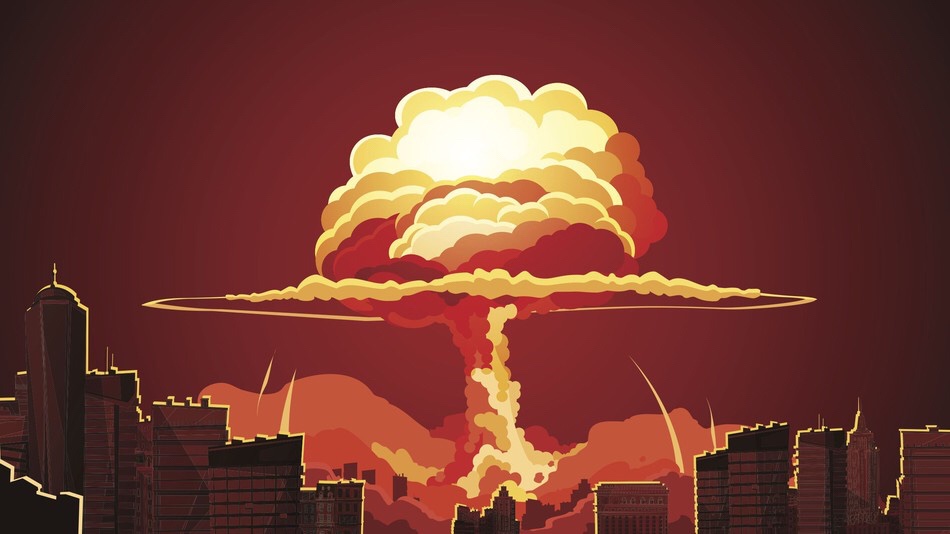 Pentagon’s proposed nuclear strategy elevates cyberattacks to a terrifying new realm
Pentagon’s proposed nuclear strategy elevates cyberattacks to a terrifying new realmBy Sasha Lekach
Image: shutterstock/Macrovector
It's the fall of 2019 and America is paralyzed.
A wave of cyberattacks have crippled America's banks, sent a blackout rolling across the East Coast, and disabled almost all U.S. internet infrastructure.
America's response is nuclear. A submarine off the coast of North Korea launches ballistic missiles at the tiny, reclusive country, marking the first use of nuclear weapons in battle since 1945. In response, China and Russia prepare for war, and the world watches as an all-out nuclear exchange is suddenly a very real proposition.
This scenario, previously impossible, would be just one of the many that the U.S. government would have to prepare for under the Pentagon's new proposals for how to respond to cyberattacks.
The recently released draft of the Pentagon's proposed nuclear strategy shows an administration bullish on nuclear weapons — even for "non-nuclear" attacks like a cyberattack or hack. This is the first time a U.S. administration has sought to enshrine in policy that cyberattacks against America could result in nuclear war.
This is the first time a U.S. administration has sought to enshrine in policy that cyberattacks against America could result in nuclear war.
Experts warn this is a dangerous, slippery slope toward a nuclear exchange that, once started, is difficult to limit or stop.
Richard A. Clarke, former national coordinator for security, infrastructure protection and counter-terrorism under President George W. Bush, said the proposed policy is, in a word, insane.
"I think it’s cavalier to expand the concept of nuclear weapons use," he said. "It’s insane, actually."
Clarke was quick to point out that cyberattacks can never match the potential fatalities of a nuclear bomb.
"I think there is a very dangerous policy move to expand the scope of things that would allow us to use nuclear weapons," he said. "Nuclear weapons is a last resort — not something we should contemplate doing unless we absolutely have to."
On a strategic level it's also flawed, he said. It's too dangerous — the effects of nuclear winter are no joke — and it's not credible to believe the U.S. would respond to something like an infrastructure attack with nukes.
"It just makes no sense whatsoever," Clarke said.
Joe Cirincione, president of the Ploughshare Fund, called the proposed strategy plans "absurd." In a phone call, the anti-nuclear advocate said a nuclear response would be disproportionate to the threat of a cyberattack.
"Under this policy, the Trump administration would feel justified in using nuclear weapons on (Russia meddling in the election)," he said.
One part that stood out of the draft report, known as the Nuclear Posture Review, first published in a non-classified form on The Huffington Post, was the mention of "significant non-nuclear strategic attacks." This seems to imply that the U.S. could retaliate with nukes against an attack on U.S. infrastructure, such as the power system.
Other methods of retaliation would still be considered, but this is the first time cyberattacks would trigger a nuclear response, as The NewYork Times reported.
The prospect of using nuclear weapons against a cyberattack appears extreme but also highlights just how seriously some experts are taking the prospect of modern cyberwar.
Cirincione said cyberattacks can be extremely dangerous, but hacks on systems controlling trains, dams or power supplies don't warrant this response. He sees the plan as an attempt to justify more use of nuclear weapons.
"If the only tool you have is a nuclear weapon, every mission is a massive threat," he said.
Jeffrey Knopf, professor of nonproliferation and terrorism studies at Middlebury Institute of International Studies at Monterey, California, said in a phone call the proposal is a terrible idea that's "an excuse to keep and build new nuclear weapons."
"Nuclear taboo" has kept nations from nuking each other for decades, but with this plan the U.S. is willing to break that over something like a cyberattack, Knopf said.
This proposal is also telling about the administration's struggles to deter cyberwarfare. The Pentagon is essentially "throwing everything at the wall and seeing what sticks," Knopf said.
The White House is still reviewing the strategy and a final version isn't expected for several weeks. The leaked version may change in coming weeks, and ultimately the review is a "wish list," as Knopf called it. For real policy changes to actually come from the updated nuclear guidance, Congress would need to pass budgets and funding. It's not a quick path to implementation.
Clarke, the former White House cybersecurity czar, can't fathom how the Trump administration is using cybersecurity for nuclear justification. He says over the years this type of policy has been "rejected by everyone except the lunatic fringe."
Maybe so, but like on many policy issues these days, it seems the lunatic fringe has crept into mainstream thinking.
No comments:
Post a Comment